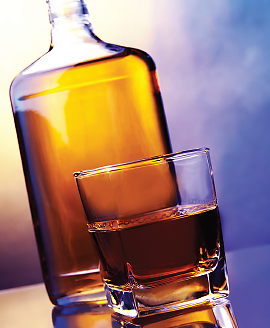Dependence May Result When Alcohol Used to Self-Medicate
Abstract
Subjects who had used alcohol to self-medicate their symptoms were three times more likely to develop alcohol dependence than subjects who had not done so.
Using alcohol to self-medicate mood symptoms can be risky, a new study reported May 1 in JAMA Psychiatry suggests. The study was headed by Rosa Crum, M.D., a professor of epidemiology, psychiatry, and mental health at the Johns Hopkins Medical Institutions.
Data were derived from the National Epidemiologic Survey on Alcohol and Related Conditions (NESARC), which was conducted by the National Institute on Alcohol Abuse and Alcoholism. It consisted of face-to-face interviews with a nationally representative sample of about 43,000 Americans to learn whether they had DSM-IV psychiatric or substance use disorders. The initial surveying took place in 2001 and 2002. The survey was again conducted in 2004 and 2005 with as many of the original subjects as possible—some 35,000 people. Crum and her colleagues used data from both the initial and follow-up surveys for their study.

Caption: no caption necessary
First Crum and colleagues focused on the approximately 4,200 subjects who had been found in the first NESARC survey to have mood symptoms but not alcohol dependence and who had been asked whether they used alcohol to self-medicate their mood symptoms. Then, from the second survey, they evaluated whether subjects who had used alcohol to self-medicate their mood symptoms were more likely to develop alcohol dependence than were subjects who had not used alcohol to self-medicate mood symptoms.
The researchers found that subjects who had used alcohol to self-medicate their symptoms were three times more likely to develop alcohol dependence than were subjects who had not used alcohol to self-medicate. Moreover, 12 percent of the individuals who developed alcohol dependence could possibly attribute their dependence to self-medicating their mood symptoms with alcohol.
In addition, Crum and colleagues focused on about 1,500 subjects who had been found during the first NESARC survey to have both mood symptoms and alcohol dependence and who had been asked whether they used alcohol to self-medicate their mood symptoms.
Using data from the second survey, the researchers assessed whether subjects in this second group who had used alcohol to self-medicate mood symptoms were more likely to remain alcohol dependent than subjects who had not used alcohol to self-medicate their symptoms.
This turned out to be the case. Those who had used alcohol to self-medicate were three times more likely to remain alcohol dependent as were subjects who had not used alcohol to self-medicate. Furthermore, 31 percent of subjects who had been alcohol dependent and were still dependent at the time of the second NESARC survey could possibly attribute their persistent dependence to self-medicating their mood symptoms with alcohol.
Finally, the researchers assessed whether this link between self-medication and alcohol dependence or the link between self-medication and persistent alcohol dependence differed for various subgroups within the two cohorts—men and women, young and old, individuals of various ethnic or racial backgrounds, those with few mood symptoms or a lot of symptoms, and those who had received treatment for their mood symptoms and those who had not.
They found that similar links existed for all of these subgroups.
The two results that surprised them, Crum told Psychiatric News, were that the link held even among individuals who had received treatment for their mood symptoms and was found as well among individuals who did not meet full criteria for a mood disorder.
The findings have clinical implications, Crum suggested. “Individuals who report mood symptoms should have an evaluation to assess whether clinical treatment is needed, but should not drink alcohol to help themselves feel better. Patients with mood symptoms in psychiatric treatment may need to be educated regarding the potential risks of using alcohol for self-medication, as well as assessed for the presence of alcohol disorders.”
The study was funded by the National Institute on Alcohol Abuse and Alcoholism, the National Institute on Drug Abuse, the Canadian Institutes of Health Research, the Manitoba Health Research Council, and the Johns Hopkins School of Medicine. ■
An abstract of “A Prospective Assessment of Reports of Drinking to Self-Medicate Mood Symptoms With the Incidence and Persistence of Alcohol Dependence” is posted at http://archpsyc.jamanetwork.com/article.aspx?articleid=1684867.



